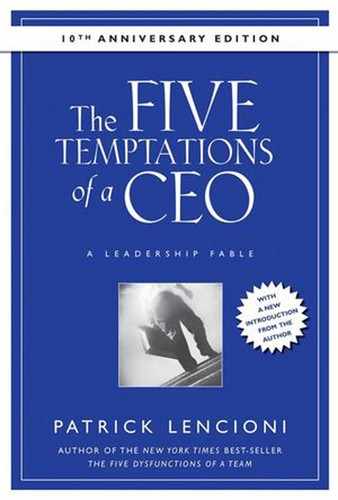Afterword
All leaders struggle because, like Andrew, they are susceptible to one or more of the five temptations. But having those temptations is not why they ultimately fail. Leaders fail because they are unwilling to put their temptations on the table for others to see. For it is only by bringing their temptations into the open that leaders can enlist the support of subordinates who are in a unique position to help.
The trouble is that this calls for a seemingly excessive level of scrutiny, which many leaders resent and resist. They cannot understand why people in their organizations continue to monitor and comment on their behavior when there are so many other problems within the company that need fixing. Of course, they are missing the point entirely. What they perceive as criticism is actually invaluable counsel.
When I work with executive teams, I explain that if the CEO’s behavior is ninety-five percent healthy while the rest of the organization is just fifty percent sound, I’ll choose to focus on that crucial and leveraged five percent that makes up the remainder of the CEO’s behavior.
Although every leader agrees in theory with this line of thinking, few are willing to put it into practice and endure the painful self-examination required to “fix” that final five percent. And yet, a willingness to do this is exactly what separates leaders who succeed from those who fail.
If this is so, then why don’t all leaders endure the pain? Because too many of them mistakenly believe they can avoid it and still find a way to succeed. What they are doing is trading short-term pain (the struggle) for long-term pain (failure).
The key to success, then, is not to avoid the susceptibility to the five temptations. While that would be desirable, it is an impossibility. The key is to embrace the self-examination that reveals the temptations and to keep them in the open where they can be addressed.
Of course, this cannot be accomplished overnight; it cannot be wrapped in a tidy, happy ending in which our heroic CEO realizes his temptations and suddenly becomes the world’s most effective leader. Like so much of life, it is a messy, constant, and unavoidable process, but one that great leaders welcome.
..................Content has been hidden....................
You can't read the all page of ebook, please click here login for view all page.
